Research Report: 2021
▼ Choose a report:

Powered by Research & Graduate Studies
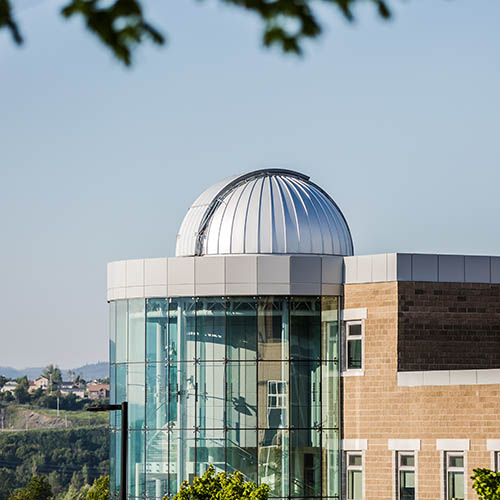
Powered by Arts and Social Science
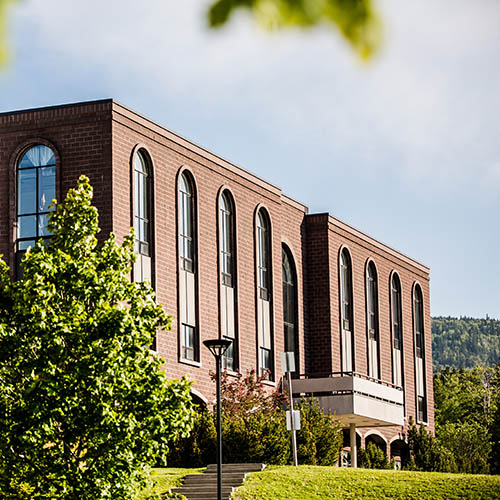
Powered by Fine Arts

Powered by Science and the Environment

Jump To:
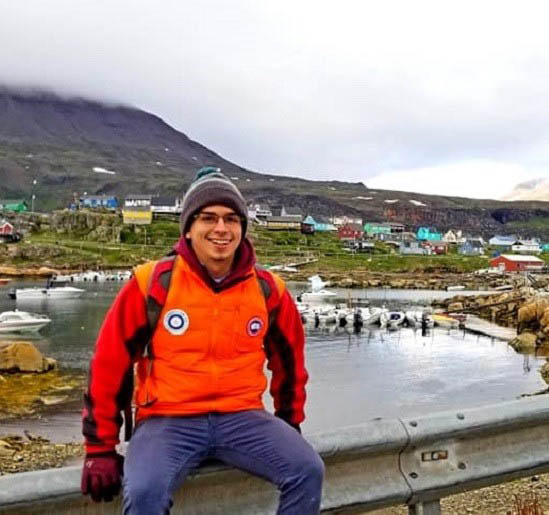
Brady Reid
A graduate of Grenfell's master of arts in environmental policy won an engaged research award form Research Impact Canada (RIC) in 2021. The Research Impact Canada (RIC) Engaged Scholarship Award for Graduate Students, which is in its inaugural year, recognizes graduate students that conduct research projects following engaged scholarship principles that lead to increased awareness of audiences beyond academia or changes in stakeholder actions, practices, guidelines, or policies.
Brady Reid, who is pursuing a PhD in rural studies at the University of Guelph, graduated with an MA in Environmental Policy in 2019. Brady was co-supervised by Dr. Kelly Vodden (Environmental Policy Institute, Grenfell Campus) and Dr. Scott Neilsen (Labrador Institute).
"Effective engagement and knowledge mobilization are gaining momentum as key pieces of research to maximize its impact," said Mr. Reid. "I'm honoured to be recognized in this inaugural award by RIC but I would be nowhere without the guidance and collaboration of community leaders throughout this project and am eager to continue learning and growing as an engaged scholar."
Here is some background on Mr. Reid's work, as provided by RIC:
Mr. Reid's research interests include environmental decision-making, rural community development, and collaborative research with Indigenous groups.
Mr. Reid's collaborative project - Traditional Knowledge and Land Use: Building Research Relationships with a Rural Ktaqmkuk Mi'kmaw Community - emerged from a collaborative research effort between the Elder Calvin White and the No'kmaq Village Mi'kmaw Band and Grenfell Campus, Memorial University.
"Aside from a written master's thesis, this project included a podcast, which described the results of our study and responsibility for researchers working with Indigenous groups," said Mr. Reid, who also coordinates the PhiLab Atlantic Hub research network and serves as the Regional Studies Association blog editor. "This approach helped increase accessibility and mitigate the alienation of community participants from research results through conversational discourse."
Mr. Reid, along with the other winners, presented his work at the 2021 Canadian Association of Research Administrators (CARA) Conference.
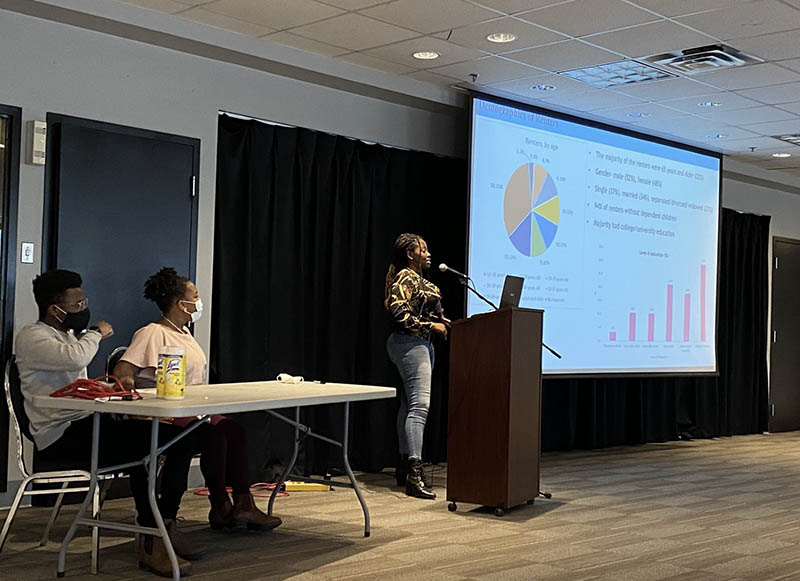
In late 2021, Graduate students in the MA environmental policy and PhD Transdisciplinary Sustainability programs presented research findings to service providers and community representatives.
Landlords, tenants and service providers in the Corner Brook-Bay of Islands-Deer Lake-Bay of Islands area were invited to attend a community update about data collected so far through the collaborative project, "Quantifying Housing Needs in Western Newfoundland." The project involved a tenant survey, landlord survey, and a service-based count.
The Community Mental Health Initiative, Grenfell Campus, Building Resilience: Community Engaged Research Lab and the members of the Community Coalition on Housing & Homelessness are partnering on the project, with funding in part from the Government of Canada through Reaching Home: Canada's Homelessness Strategy.
The research aims to quantify and describe present rental housing availability, as well as determine the number and type of homeless persons, including the hidden homeless, in the Corner Brook, Deer Lake and Bay of Islands area.
"The research will help members of the CCHH identify gaps and make informed decisions when it comes to developing housing support programs, advocating for policy changes, and accessing funding for new housing support initiatives. Understanding the housing needs from a tenant's perspective with respect to affordability, quality and sense of security is needed to achieve the goal," said Jade Kearley, interagency co-ordinator with the Community Mental Health Initiative.
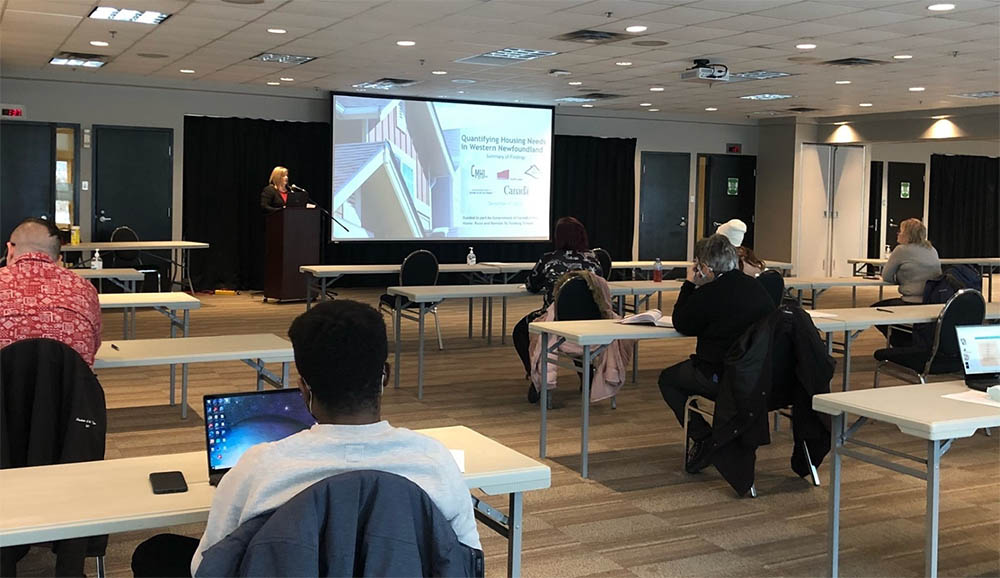
Grenfell graduate students Amanda Affram, Rasheed Ature, and Genevieve Blankson presented the research, which demonstrated several trends.
Ninety-two people had answered the survey at that point. Preliminary results found that the Corner Brook-Bay of Islands-Deer Lake area typically see rental units vacant for a month or less in a year, and that while base rental fees may seem somewhat reasonable, the addition of utilities on top of rent seems to make units unaffordable for many. The average cost of rent was $689 per month, with 76% of tenants paying for utilities on top of that (an additional $149 per month, on average).
Rental quality was generally reported to be good, though some tenants felt unsafe in their rental unit (9% felt unsafe in their unit during the day, and 14% at night). Accessibility of units could also be improved for those with disabilities or who were aging (64% of units were not wheelchair accessible, according to the landlord survey).
Service providers who completed surveys reported that homelessness in the region ranged from outdoor living, to residing in shelters, to living with friends and relatives. The majority of clients captured in the service-based count were provisionally accommodated, living in transitional housing or with family and friends (63%).
For more information, please contact Leanna Butters, lbutters@grenfell.mun.ca or visit www.housingresearchnl.com.
Learn more:
https://www.cbc.ca/news/canada/newfoundland-labrador/corner-brook-housing-1.6270759
http://ntv.ca/two-groups-study-extent-of-homelessness-in-western-newfoundland/
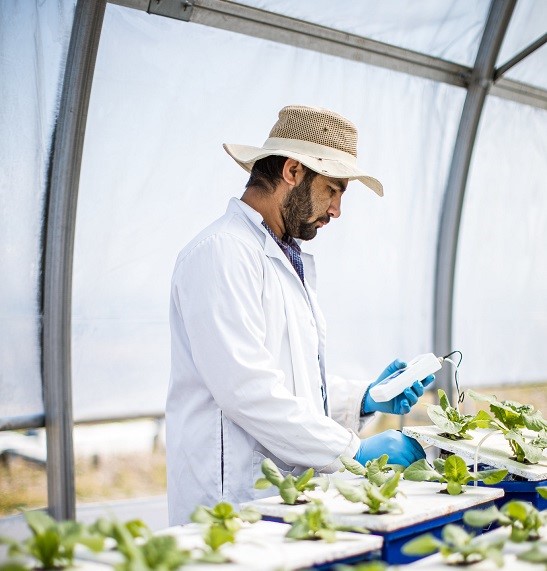
Candace Kennedy
The research of Muhammad Faran may change the way farmers grow produce in Newfoundland and Labrador.
Mr. Faran, who graduated in 2021 with a master of science in boreal ecosystem and agricultural sciences, came to Grenfell Campus, Memorial University, from Jhang, Punjab, Pakistan, in July 2018.
His research, titled "Potential use of dairy digestate as a biofertilizer: Effects on growth and yield of lettuce in hydroponics," is the result of a collaboration between Grenfell Campus and New World Dairy, located in St. David's, NL.
Industry collaboration has been a central aim of the Office of Research and Graduate Studies - especially involving graduate students in that research. "The work Mr. Faran, and other graduate students, is doing with New World Dairy is of utmost importance to the future of hydroponic greenhouse agriculture in our province," said Dr. Mumtaz Cheema, graduate student supervisor and interim associate vice-president, research and graduate studies. "His findings will help us understand how we can use a previously discarded waste source as part of a rich biofertilizer."
To put it simply, Mr. Faran utilized the digestate, or manure, of the cows at the dairy farm as a fertilizer for lettuce in his hydropnic greenhouse laboratory.
"Hydroponic vegetable production using anaerobic digestate liquid waste as a sole nutrient source is a pragmatic approach to integrate food production and liquid waste management," said Mr. Faran. "Dairy digestate could be used as a sustainable organic fertilizer for lettuce production in hydroponic system." The added plus is dairy farmers have a new approach for waste management.
Mr. Faran hopes to continue his work through the new PhD in boreal ecosystems and agricultural science, which will take in its first students in September.
"Grenfell has well qualified professionals and the fee structure here at Grenfell is low as compared to other universities in Canada," he said, adding that he has applied for his wife, Shagufta Rasheed, to join him in Corner Brook. "I will always remember the friendliness and kindness of all the faculty, staff and students."
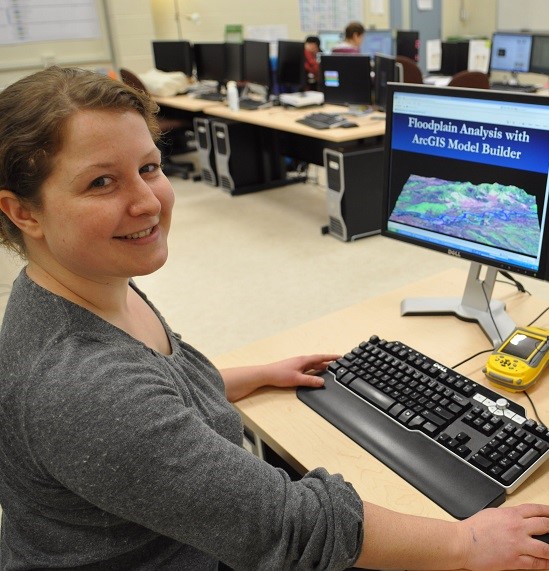
Kristin Scott is a graduate of College of the North Atlantic's GIS applications specialist (post-diploma) program. She has had a varied career, landing her in places such as Spain, Belgium and with the WHO in Germany. Photo: CNA
The new master of science in applied geomatics is a true union of theory and application.
Introduced in 2021, the program is the brainchild of researchers and practitioners at Grenfell Campus, College of the North Atlantic's (CNA) Corner Brook campus and Natural Resources Canada's Canadian Forest Service. The M.Sc. (Applied Geomatics) program was approved by Memorial University's Board of Regents earlier this month.
"We're thrilled to build on our well-established connections with CNA's Corner Brook campus and the Canadian Forest Service (CFS)," said Dr. Jeff Keshen, former vice-president, Grenfell Campus. "This program builds on core strengths in geomatics training at CNA, and on a diverse set of researchers with research programs that are spatial in nature at Grenfell Campus and its provincial and federal partners."
He emphasized that the development of the program was the product of true collaboration, involving individuals from Grenfell, CNA, and CFS, who recognized a need and a local opportunity to train highly skilled GIS users to fulfill that need. Dr. Robert Scott of Grenfell's School of Science and the Environment worked closely with Mr. Darin Brooks, GIS applications specialist (post-diploma) instructor at CNA, and Dr. Brian Eddy, a research scientist at CFS in Corner Brook, among other practitioners and researchers in the field and at other Canadian post-secondary institutions.
The innovative degree combines the latest research in various academic fields with training in advanced geomatics information technology. Geomatics, or geoinformatics, generally refers to the use of geospatial and geostatistical technology to collect, organize, store, integrate, analyze, interpret, report, and disseminate geographic information.
"The geomatics industry contributes substantially to Canada's GDP (gross domestic product), with an approximate $20-billion contribution through design, implementation and use of geomatics products," said Brent Howell, dean, School of Natural Resources and Industrial Trades. "The M.Sc. (applied geomatics) program is designed to attract stakeholder engagement across a variety of government and non-government stakeholders. CNA is delighted to have a role in this three-party collaboration, so that we can provide a solid foundation for graduates so they can continue their pursuit of a master's degree."
Students who enroll in the master's program will receive comprehensive contemporary instruction (theory and applied) in several sub-disciplines: geographic information systems (GIS), geospatial/geostatistical analysis, geovisualization, geodatabase design, remote sensing, programming, global positioning systems (GPS), project management, and others.
"When today's students enter the workforce they are increasingly required to work with specialists from diverse disciplines to address complex problems," said Dr. Scott, adding that the notion of "mapping" is becoming an increasingly integral requirement in many subject areas within the natural sciences and social sciences, as well as the arts and humanities. "The program will offer students the opportunity to become geospatial specialists while applying their expertise to a research project, developing the high-level expertise across all geospatial techniques at the outset followed by the opportunity to apply expertise to a master's thesis project."
The M.Sc. (applied geomatics) program will train students in a field that has a high employability rate - roughly 20,000 individuals are employed in geomatics-related jobs in Canada.
"The Canadian Forest Service, situated in Grenfell's Forest Centre, will provide a rich and rewarding opportunity for these M.Sc. students and NRCan scientists to interact on projects of mutual interest," said Dr. Eddy. "The west coast of Newfoundland provides an ideal environment for research in ecology, natural resources, and community and regional development. This, combined with its smaller community setting and presence of a number of provincial and federal government agencies and other stakeholders in the region, provides a unique advantage with regard to offering this applied master-level program."
Students wishing to enroll in the program must have completed an undergraduate degree, as well as the nine-month GIS applications specialist (post-diploma) program at CNA before they will be admitted into the M.Sc. (applied geomatics) program.
Individuals wishing more information on the M.Sc. (applied geomatics) program should contact Dr. Scott at rscott@grenfell.mun.ca. To learn more about the GIS applications specialist program, visit: www.cna.nl.ca. For information about CFS, visit the Atlantic Forest Centre here.